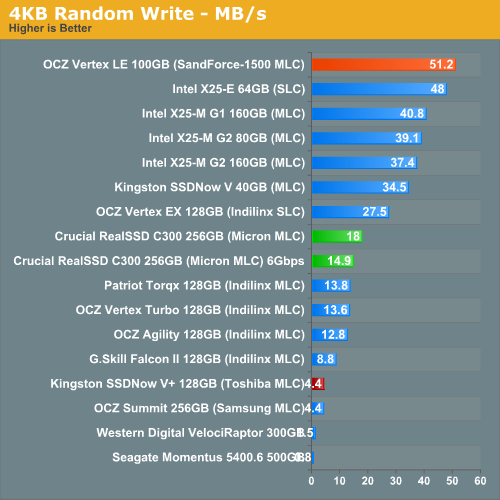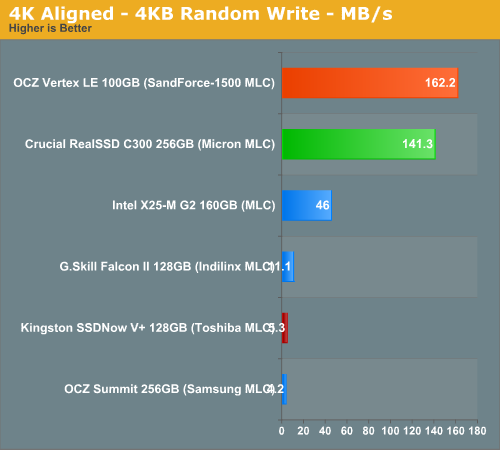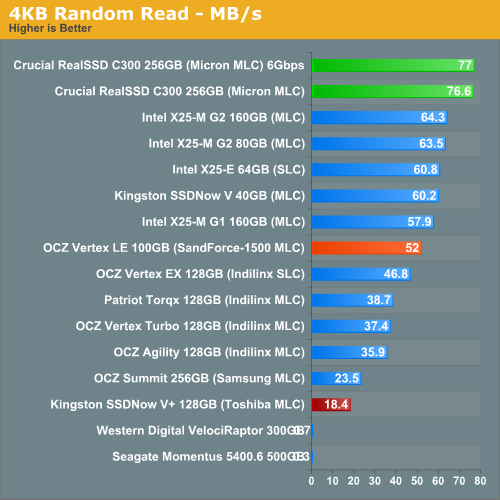OCZ’s Vertex Limited Edition Review & SSD State of the Union
by Anand Lal Shimpi on February 19, 2010 12:00 AM EST- Posted in
- Storage
Random Read/Write Speed
This test writes 4KB in a completely random pattern over an 8GB space of the drive to simulate the sort of random writes that you'd see on an OS drive (even this is more stressful than a normal desktop user would see). I perform three concurrent IOs and run the test for 3 minutes. The results reported are in average MB/s over the entire time.
I've had to run this test two different ways thanks to the way the newer controllers handle write alignment. Without a manually aligned partition, Windows XP executes writes on sector aligned boundaries while most modern OSes write with 4K alignment. Some controllers take this into account when mapping LBAs to page addresses, which generates additional overhead but makes for relatively similar performance regardless of OS/partition alignment. Other controllers skip the management overhead and just perform worse under Windows XP without partition alignment as file system writes are not automatically aligned with the SSD's internal pages.
First up is my traditional 4KB random write test, each write here is aligned to 512-byte sectors, similar to how Windows XP might write data to a drive:

The OCZ Vertex LE does ridiculously well here, outperforming even Intel's X25-E. The Crucial RealSSD C300 does ok, a bit better than the Indilinx drives but no where near as good as the Intel based offerings. The reason being that the C300's controller doesn't actually attempt to reorganize unaligned writes on the fly. Look at what happens to 4K random write performance if we only write to 4K-aligned addresses:

Not only does the Vertex LE jump in performance to over 160MB/s, but so does the RealSSD C300. The Intel and Indilinx drives also get a small boost, but nothing huge by comparison. Modern 4K-aware OSes write data in 4K aligned addresses, which matches up perfectly with the 4K page size on all of these SSDs. You can also guarantee higher performance in older OSes like Windows XP by re-mapping the LBAs on the fly but that requires additional overhead. These newer drives forgo performance under Windows XP, for significantly better performance under Windows Vista/7 and Mac OS X 10.5/6. It makes sense given that Intel's X25-M was designed back in 2005 - 2007 while these newer controllers were more recent endeavors.

Random read performance is great on the C300 but a bit lower on the Vertex LE. None of these drives are posting bad figures here though. For the price the Kingston SSDNow V+ doesn't appear to deliver its worth.










83 Comments
View All Comments
anikolayev - Friday, February 19, 2010 - link
I just bought an OCZ Agility based on your benchmarks, the ones suggesting the drive is capable of 160MB/s writes. However it has been confirmed by several other customers that the current batch being shipped by NewEgg uses different chips in the OCZ lottery which comes up with 100-130MB/s writes. This is very significant for people buying this drive for video capture related purposes, since 100 is hardly any better than the average 70 on a standard HDD.The Agility's random writes that you show in the charts and latest article are also almost double of the drives being shipped right now. After countless tweaks I can barely do 7MB/s, forget 12.
I understand the Agility is a dated drive, but it's still very popular due to recent sales ($130 for 60GB) and I think it would help your readers to take a look at updated performance numbers that are more realistic to what they will actually get.
Also there's no refunds with SSDs, so anyone buying into these charts will just have to live with what they get.
v12v12 - Tuesday, February 23, 2010 - link
FYI... 100 vs 70 is THIRTY PERCENT FASTER DUH? 30% is HUGE in regards to technological competition/advancements. Where have you been all these years? Show us a 30% performance gain (aside from SSD beta testing and new releases) in 1-2 mechanical HD generations... Umm you CAN'T>.<AnnonymousCoward - Tuesday, February 23, 2010 - link
> FYI... 100 vs 70 is THIRTY PERCENT FASTER DUH?Duhhh it's 43% :)
hardwareguy - Saturday, February 20, 2010 - link
If you want and SSD that's fast and cheap the agility is hard to beat. If that last bit of performance is important you can buy one of the vertex turbos or an intel drive but it quickly gets un-cheap. Even a 3/4 speed agility is still 10x better than a spinning metal drive.Anand Lal Shimpi - Saturday, February 20, 2010 - link
Hmm, what size drive do you have? I tested the 120GB Agility I believe which has higher read/write specs than the rest.Take care,
Anand
bji - Friday, February 19, 2010 - link
They've admitted that they are building only a limited number of drives, so how will they honor the three year warranty? It's unlikely they will be able to replace a dead drive with another OCZ Vertex Limited Edition, since there won't be any more. Will they replace with an equivalent drive? If so, what would the equivalent drive be?I continue to be skeptical of SandForce's controller technology. I would be interested in seeing some more rigorous testing done on these drives, such as repeated and random simulated power outages during writes, to ensure that the drive doesn't brick itself if power is lost at an inopportune time (especially as this version does not have the supercap).
Exelius - Wednesday, February 24, 2010 - link
Typically what they would do is either hold back a percentage of production for warranty replacements. Once they run through these they'd just offer you an equivalent current product.LazerFX - Friday, February 19, 2010 - link
Someone's not read the article...From the "Final Words" page, reproduced here so that anyone else reading the first few pages can get the answer:
"If you’re willing to take the risk, the Vertex LE appears to be the best SSD you can buy at $399. It is a difficult proposition simply because we have had such limited experience with the drive and the controller/firmware have a completely unproven track record. It really boils down to how much of an early adopter you are. At least OCZ as a company tends to take care of its customers, so even if you do take the jump and something does go wrong you won’t be SOL. The Vertex LE will ship with a 3 year warranty and if your drive dies you'll get another LE (OCZ is putting some aside), Vertex 2 or other equivalent in its place.
OCZ’s CEO Ryan Petersen and I could always get into another yelling match if you aren’t taken care of."
So... there you go.
Kibbles - Saturday, February 20, 2010 - link
even if they run out of those they put aside. they still have the enterprise versions.bji - Friday, February 19, 2010 - link
Absolutely right, my answer was there and I posted before reading all the way to the end. Mea culpa.